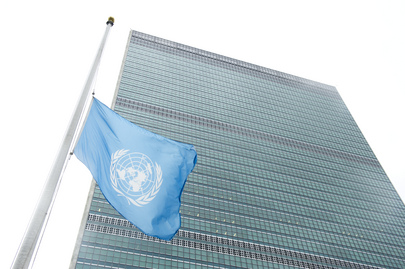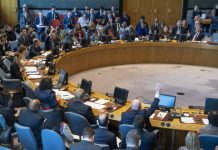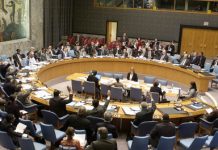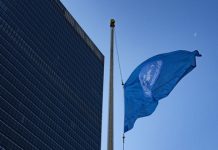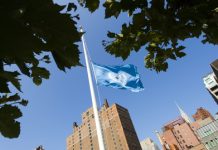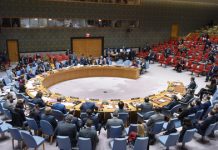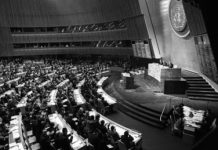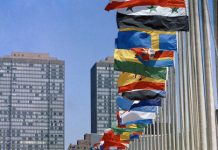The six who remain at large were either key members or associated with the Al Kaniyat militia that controlled Tarhuna from at least 2015 to June 2020, when government forces ousted them from the city, which is located about 65 kilometres (about 40 miles) southeast of Tripoli.
The arrest warrants against Abdurahem Khalefa Abdurahem Elshgagi “Al Khani”, Makhlouf Makhlouf Arhoumah Doumah “Douma”, Nasser Muhammad Muftah Daou “Al Lahsa”, Mohamed Mohamed Al Salheen Salmi “Salheen”, Abdelbari Ayyad Ramadan Al Shaqaqi “Al Shaqaqi” and Fathi Faraj Mohamed Salim Al Zinkal “Al Zinkal” were unsealed last month.
Since June 2020, hundreds of bodies have been exhumed from mass graves in and around Tarhuna, allegedly victims of crimes amounting to war crimes, including murder, torture, sexual violence and rape.
Dignified, steely determination
Briefing ambassadors on the Security Council from the Libyan capital Tripoli, ICC Prosecutor Karim Khan spoke of his meetings and interactions with families of the victims.
“Today, one individual said something very simple and very true, that every household in Tarhuna has a victim. Every person that detailed a loss has suffered an end to their universe, and heartbreak was palpable and sincere,” he said.
He also relayed their “steely determination”.
“They have a clear conviction – the justice and accountability and fair processes are essential for themselves, their families, their community and for Libya at large,” he added, stressing the importance of international support to execute the warrants.
He called for the assistance of the Security Council, State Parties to the Rome Statute of the ICC, and other non-State Parties to ensure that the suspects are apprehended and brought to justice, in an independent, free and fair trial.
New paradigm shift
Mr. Khan also highlighted a “new paradigm shift” that progress is possible, discernible and can be identified.
He noted significant progress in investigations related to detention facility crimes and crimes committed between 2014 and 2020, adding that further applications for arrest warrants are expected over the coming months.
Some of the applications may be secret to seize arrest opportunities, he said.
Mr. Khan also highlighted the need for continued partnership with Libyan authorities to achieve these goals, citing positive outcomes of his meetings with Libyan officials, including the Attorney General and the establishment of a new mechanism to coordinate investigations and prosecutions.
The ICC team has also intensified engagement with civil society organizations, noting that his team met with over 70 Libyan civil society groups and human rights defenders and discussed their expectations.
“[They] are not an appendage [but] at the heart of our discussions,” Mr. Khan said.
Karim Khan (on screen), Prosecutor of the International Criminal Court (ICC), briefs the Security Council meeting on the situation in Libya.
Plans are working
In conclusion, he recalled the roadmap for completing the investigative stage of the judicial process.
“I believe, collectively through these combined activities, these plans are working,” he said, stressing that the “hopes, expectations and steely determination of victims need to be at the forefront.”
While there are many challenges and the next steps will not be straightforward, he expressed his belief that there is space to develop solutions to problem that has plagued Libya for over 13 years.
Security Council referral
While not a UN organization, the ICC has a cooperation agreement with the United Nations. When a situation is not within the Court’s jurisdiction, the Security Council can refer the situation to the ICC granting it jurisdiction.
The situation in Libya was referred to the ICC Prosecutor by the Security Council in resolution 1970, adopted in February 2011. In March, the Prosecutor announced the decision to open an investigation.
In that resolution, the Council also imposed targeted sanctions, including a travel ban on President Muammar Al-Qadhafi and other senior figures in his administration, including some family members.
Source of original article: United Nations (news.un.org). Photo credit: UN. The content of this article does not necessarily reflect the views or opinion of Global Diaspora News (www.globaldiasporanews.com).
To submit your press release: (https://www.globaldiasporanews.com/pr).
To advertise on Global Diaspora News: (www.globaldiasporanews.com/ads).
Sign up to Global Diaspora News newsletter (https://www.globaldiasporanews.com/newsletter/) to start receiving updates and opportunities directly in your email inbox for free.


